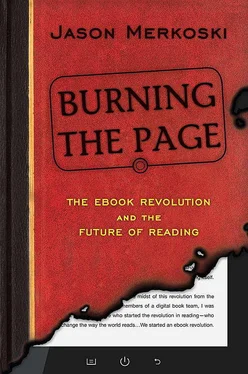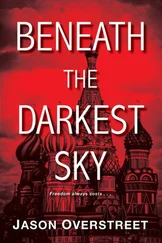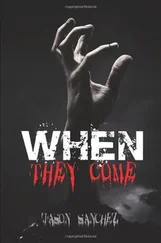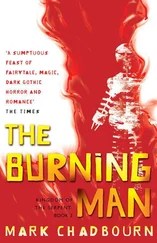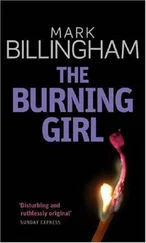Jason Merkoski
BURNING THE PAGE
The eBook Revolution and the Future of Reading
“This is a book, my darling. A magic book…”
Her eyes got wide. The book began to talk to her.
—Neal Stephenson,
The Diamond Age
This book is based on my recollections of the time I spent working on the front lines of the ebook revolution. It also contains my opinions and predictions about the development of ebooks: where we have been and where we are heading. The content of this book is based on my opinions and personal experiences and on publicly reported data about Amazon and other companies.
The opinions, predictions, and content expressed in this book and in the online portions of this book via links at the end of each chapter are entirely my own and are not those of Amazon, its affiliates or subsidiaries, or Sourcebooks, Inc. Neither is responsible for the contents of this book or the online portions of this book.
This is a story about ebooks. It’s a story about Google, Jeff Bezos, and the ghost of Gutenberg. It’s the true story of the ebook revolution—what ebooks are and what they mean for you and me, for our future, and for reading itself.
I was fortunate to find myself in the midst of this revolution from the beginning. As one of the founding members of Amazon’s Kindle team, I was part of a small group of people who started the revolution in reading, who set out to change the way the world reads. I got in on Kindle on the ground floor with the goal to make all books in all languages downloadable in less than sixty seconds. At Amazon, I was an engineering manager, program manager, product manager, and evangelist. This gave me a big-picture perspective on ebooks, on how they were created, sold, and read.
I not only learned all about ebooks during this time, but also invented many of the features we now take for granted. If you use a Kindle, I had a hand in shaping it. During the half decade I was there, Kindle succeeded beyond our imaginations. It succeeded in sales, in popularity, and in changing how we read. We wanted to change the world, and we did.
We started an ebook revolution.
When I talk about revolution, I’m not referring to political or regime-changing revolutions like the Khmer Rouge reign of terror or the French Revolution. I’m not talking about massacres and beheadings. I’m talking about movements that change how we live, think, and perceive the world around us, such as the Industrial Revolution or the civil rights movement. I’m talking about a technical revolution, a scientific revolution, a social revolution.
Revolution is what you get when technology and culture collide.
The ebook revolution is changing all the rules for reading and writing. It’s changing entertainment, and it’s allowing our culture to immortalize itself through digitization. Ebooks can do things print books never could. You can now download an ebook as fast as you can call a friend on the phone. You can fit a library in your pocket. You can send a thousand ebooks to a village school in Africa, free of worries about quarantines, customs, bribes, and tangled parachute lines. You can read an ebook at the same time as me, halfway around the world, and we can discuss it together and share our comments and thoughts on it.
Books are what make us human, what set us apart from all other animals. And by connecting with books, by crossing the chasms of culture and language through them, humanity itself becomes connected. Reading—once a primarily solitary and individual activity—can now be social on a planetary scale.
Ebooks have the power to ignite us.
These are interesting times for reading. In the 1960s, the future was “plastics,” as anyone who’s seen The Graduate knows, but these days, the future is digital. The future will have meshed and interconnected devices like e-readers that respond to you wherever you are. In some ways, the future is already here.
For example, you can start reading on an e-reader and later continue reading where you left off on your phone. The ebook doesn’t care what device you’re reading it on; it just seamlessly integrates with you wherever you are. And you can use ebooks as a canary in the coal mine to see where the future is going—not just for digital content, but for our digital lives, as well.
Are digital books the death knell for printed books, or will they breathe new life into them? Will ebooks give you features that enhance the reading experience or distract you from it? Will these experiments about the form of the book kill it? Or will they elevate books to a new place of honor in our culture? How will we change intellectually and emotionally as our reading habits change?
Tough questions.
Though I’m an ebook inventor and technologist, I’m also a humanist. Ebooks will never quite smell as nice as musty library volumes or books from your childhood that still have forgotten lilacs pressed between the pages from so many summers ago. At best, e-readers will smell like formaldehyde and plastic or the metal tang of an overheated battery.
If you’re like me, you’re passionate about books as things you can touch, that you can dog-ear or annotate, and that have covers you’ve come to enjoy. You and I both worry about what it means to put our personal libraries onto one gadget and then what would happen if we dropped it in the bathtub or stepped on it or put it with the laundry inside the washing machine. If you are like me, you have more books than you have friends, no matter what Facebook tells you about your social network.
That said, although I love print books with all my heart, I also believe in the power of ebooks. I spent five long years at Amazon inventing ebook technology, launching devices, and creating crazy new ways of reading. Because I was on the team for so long, I became the closest there was to an ebook shaman, a tribal elder who could talk to all the people who joined Amazon after me about the early days of Kindle, provide the inside scoop. So I’m going to give you the same inside scoop—but about ebooks as a whole, not just the Kindle. This book will explain how ebooks came to be, and once you know that, you can look ahead into the future of reading, communication, and human culture.
After all, sometimes the best way to see where you’re going is first to look back at where you came from.
» » »
So where did I come from? If there is a story to my life, it’s a story of books.
Some people keep a stack of magazines in their bathroom, but I keep a stack of e-readers, like a Sony Reader and a Nook and an iPad. All different kinds. I also keep a stack of books near my bed—twenty or so heaped high on top of one another, half opened. I have books to read wherever I go, even audiobooks when I’m driving. I have more than 4,000 printed books, and I can’t even count how many ebooks I own. Fiction, nonfiction: I love it all.
I was born in New Jersey, midway between the Garden State’s blueberry fields and Atlantic City’s casinos. My grandfather never learned how to read. He was a truck driver in New Jersey who barely managed to scrape up enough quarters over the years to send my father to college. My father worked at a newspaper and always came home smelling of newsprint and the latest headlines.
What can I say? Ink runs in my blood. I was a shy guy at school, so I would often read—before school, during school, after school—and in retrospect, it seems like most of the time I spent at school was inside a book.
Читать дальше
